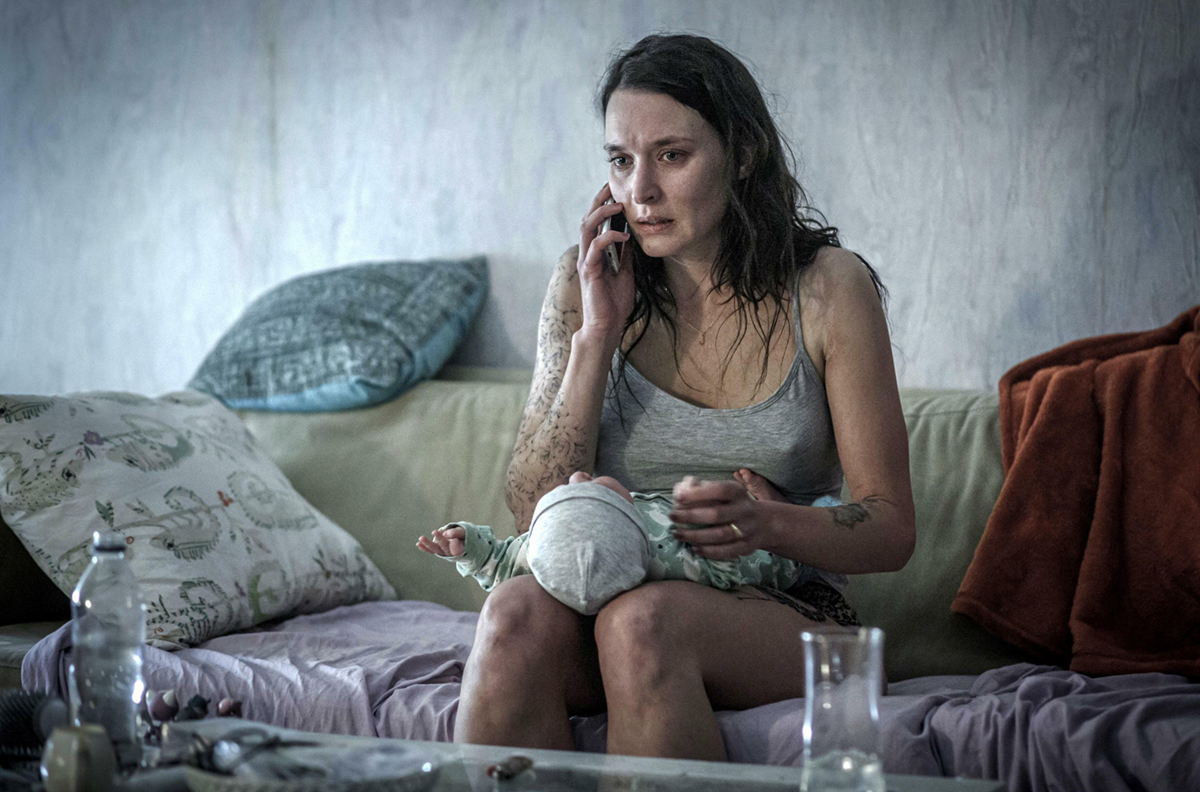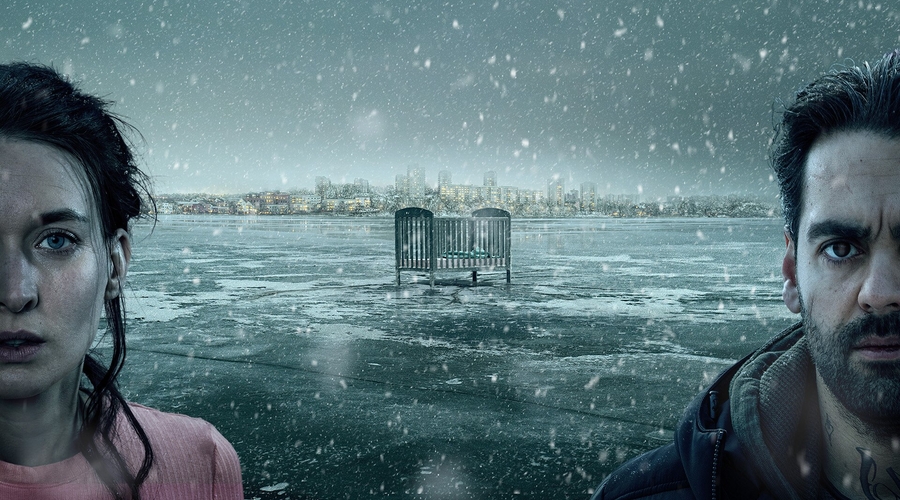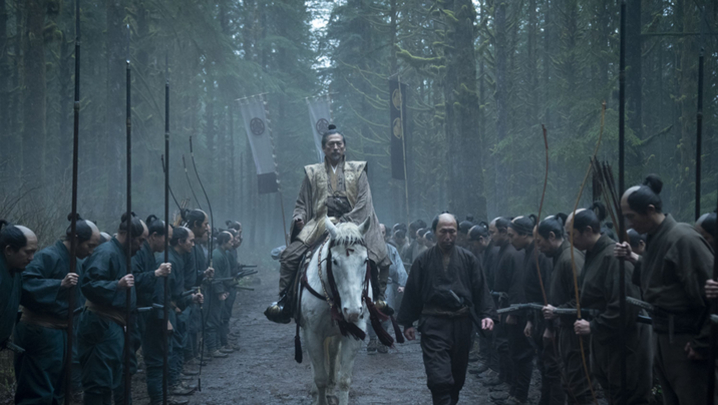A new Scandi noir usurps the convention that mums should be portrayed as loving and nurturing.
Walter Presents’ latest Scandi noir puts women, specifically mothers, at the centre of its dark and disturbing drama. In Snow Angels (Snöänglar), the lives of three women –
a mother, policewoman and a paediatric nurse – become intertwined following the disappearance of a five-week-old boy, Lucas, shortly before Christmas in a snow-covered suburb of Stockholm.
Series creator Mette Heeno explained that she had wanted to write a show about “motherhood with a lot of female leads”. The question she asked herself as a writer was: “[As a mother,] ‘What is the worst thing that could happen to you?’ That would be to wake up one morning and realise your child has gone. And then, afterwards, falling under suspicion that maybe you are involved with the disappearance of your own child.”
Heeno, speaking via a video link from Copenhagen, was in conversation with Jakob Stougaard-Nielsen, professor of Scandinavian and comparative literature at University College London, following the screening of episode 1 of Snow Angels in the Regent Street Cinema. Joining them at the RTS London event were the director, Anna Zackrisson, in person on the cinema stage, and the lead actor, Josefin Asplund, from Stockholm.
The series, funded by multiple producers from across Scandinavia, has already aired to critical acclaim in the region, and is on Walter Presents via All 4 from 11 March. The first episode also airs on Channel 4 on 13 March.
As you would expect from a Scandi drama, the characters are complex and flawed; the story more dark than light.
As sole writer, it took Heeno two to three years to pen the scripts. When Zackrisson came on board, Heeno had written three episodes and the final three were at the synopsis stage.
The director said: “When I read the first episode, my instant thought was, ‘Who the fuck are these people? They are so weird.’ That was such an amazing feeling because very often [in drama] you are supposed to immediately understand everything.”
While preparing for the series, Zackrisson recalled reading a book, Regretting Motherhood, while in a café:

“I could feel people watching and judging me… it’s such an amazingly strong taboo being a mum and not being super-nurturing or great at it.”
Heeno agreed: “It’s one of the last taboos, regretting your child or not being the mother you want to be… you don’t normally see [this theme] in crime stories; normally, they’re in quirky comedies, where mothers are trying to do their best and failing.
“We tried to do it differently, going really dark with the theme and making all the characters surrounding the [main] story also about motherhood – the grandmother who was not the best mother, the child nurse who doesn’t have children, the policewoman who cannot have children – and then putting them into a crime story.”
Zackrisson said that, by adopting the crime genre, “You put the characters very close to danger… and that makes it more interesting – you can push the characters.… Who are they? What are they capable of?”
Asplund plays Lucas’s struggling mother, Jenni, who, having taken sleeping pills on the night of her son’s disappearance, doesn’t remember anything about it.
Discussing her preparation for the role, Asplund said: “I don’t have kids myself so that was the biggest challenge – to imagine what it would feel like to lose a baby. I did a lot of research and listened to a lot of podcasts.
“I grew up in a quite [poor] area in Stockholm.… Both [Lucas’s father] Salle and Jenni appeared in my mind from my childhood – my friends’ parents who struggled with drugs and alcohol… working really hard to keep it together.
“I really wanted to do this because of the complexity of the characters – it’s so much more challenging and fun as an actor to do these kinds of characters and tell these stories.”
Heeno had pitched the idea to a room of female executives, which she felt was critical in getting the project commissioned and remaining true to her vision. “When I said I wanted to do a story about motherhood with three female leads who are very complex, and that it was very dark and doesn’t give you that much hope, these women were cheering,” she recalled.
“I’m not sure how it would [have gone] if there had been four men in that room. Maybe it would have been the same show, but I’m not sure.”
Asplund added: “For this TV show, I can’t even imagine having a guy as a director; there was a lot about my body, my boobs, not being able to breastfeed correctly. I had so many questions to Anna, like, ‘How does it feel to be pregnant?’ ‘How does it feel having sex while pregnant?’ I don’t know if I could have been completely comfortable with a man, or at least not as open.”
Snow Angels was filmed in Sweden and Denmark during the pandemic. “We just kept on shooting… there’s always a hassle filming and for me as a director there were days when we just had to do less, but that can be a positive thing,” recalled Zackrisson.
“There was an adrenaline push as well because you knew that maybe tomorrow [the authorities] were going to say, ‘You can’t shoot any more.’”
Heeno was sent the dailies and had to do any rewrites at a distance. “It was really depressing,” she said. “Normally, I’m on set a lot more and in the edit and involved in the process.
“But this is a mini-series; it doesn’t go on for ever and we’re not planning a second season. And, since Anna [directed] all the episodes, I feel like we created this together and that I didn’t have to be showrunning like I would normally do on a show. But I would, of course, have loved to be there a lot more than I was.”
What should viewers expect from the six-part series? Heeno offered a taster: “The next episodes take you back to before Lucas was born and you peel all the [layers] off the characters and you get to know them really well. Hopefully, during these episodes, you will shift your perspective on the characters.”
Report by Matthew Bell. The RTS London event was held on 22 February at the Regent Street Cinema in collaboration with UCL’s Department of Scandinavian Studies and the Embassy of Sweden. Damien Ashton-Wellman and Philip Barnes were the producers.






